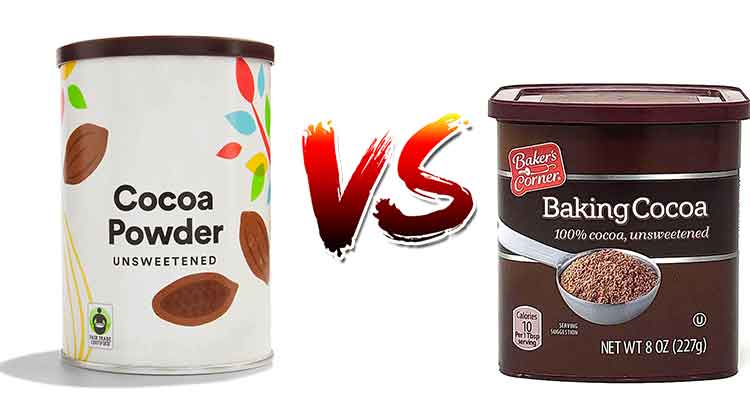When it comes to chocolatey goodness in your baking adventures, you may have come across two commonly used ingredients: baking cocoa and cocoa powder. But are they the same thing? Well, not quite!
The difference between baking cocoa and cocoa powder lies in their processing methods and flavor profiles, which can affect the overall taste and texture of your baked goods.
hile they both hail from the cocoa bean, there are some notable differences between these two cocoa products. In this article, we’ll dive into the world of baking cocoa and cocoa powder, exploring their unique qualities, how they can be used, and whether they can be substituted for one another. So, let’s put on our aprons and unravel the delightful mysteries of baking cocoa and cocoa powder together!
What Is Baking Cocoa?
Baking cocoa is a type of cocoa product that is specifically processed for use in baking recipes. It is made by grinding the cocoa beans into a fine powder and removing the cocoa butter. The resulting powder is then alkalized, which means it has been treated with an alkali compound like potassium carbonate. This alkalization process helps to neutralize the natural acidity of cocoa and gives baking cocoa a smoother and milder flavor.
When you see a recipe calling for baking cocoa, it usually means the unsweetened variety. Baking cocoa is different from other types of cocoa products like hot cocoa mix or chocolate bars. It is specifically designed for baking purposes and is often used to add a rich chocolate flavor to cakes, cookies, brownies, and other baked goods.
Baking cocoa has a deep, intense chocolate flavor that can be slightly bitter. It is important to follow the recipe instructions carefully when using baking cocoa, as its intense flavor can affect the overall taste of the baked goods. Baking cocoa is typically added to the dry ingredients in a recipe and is often paired with sugar to balance its bitterness.
What Is Cocoa Powder?
Cocoa powder is a versatile ingredient made from cocoa beans. It is created by grinding roasted cocoa beans into a fine powder, similar to baking cocoa. However, unlike baking cocoa, cocoa powder does not undergo the alkalization process. As a result, cocoa powder retains its natural acidity and has a more intense and robust flavor compared to baking cocoa.
Cocoa powder comes in two main varieties: natural cocoa powder and Dutch-processed cocoa powder. Natural cocoa powder is made from cocoa beans that have not been alkalized or processed with an alkali. It has a slightly acidic taste and a reddish-brown color. On the other hand, Dutch-processed cocoa powder is treated with an alkali to neutralize its acidity. This process produces a darker, milder, and smoother cocoa powder.
Cocoa powder is commonly used in baking, just like baking cocoa. It adds a deep chocolate flavor to various recipes, including cakes, cookies, puddings, and frostings. Cocoa powder can also be used to make hot cocoa or chocolate drinks by combining it with sugar, milk, and other ingredients.
Differences Between Baking Cocoa and Cocoa Powder
The main difference between baking cocoa and cocoa powder lies in their processing methods and flavor profiles. Baking cocoa undergoes an alkalization process, which removes the cocoa butter and neutralizes its acidity. This results in a milder and smoother flavor compared to cocoa powder. On the other hand, cocoa powder retains its natural acidity, giving it a more intense and robust chocolate flavor. The alkalization process also affects the color, with baking cocoa being lighter in color than natural cocoa powder.
Another difference is how they are used in recipes. Baking cocoa is typically used in baking recipes where a rich chocolate flavor is desired without added sweetness. It is often paired with sugar to balance its bitterness. Cocoa powder, on the other hand, is versatile and can be used in both baking and beverage recipes. It is commonly used to make hot cocoa, as well as in cakes, cookies, and other desserts.
The choice between baking cocoa and cocoa powder depends on personal preference and the specific recipe. If you prefer a milder and smoother chocolate flavor, baking cocoa may be the better option. On the other hand, if you enjoy a more intense and robust chocolate taste, cocoa powder is the way to go.
Can You Substitute Baking Cocoa for Cocoa Powder?
While baking cocoa and cocoa powder have distinct differences, they can often be used interchangeably in recipes with some adjustments. If a recipe calls for cocoa powder and all you have is baking cocoa, you can substitute it by reducing the amount slightly and adding a small amount of baking soda to neutralize the acidity. Similarly, if a recipe calls for baking cocoa and you only have cocoa powder, you can use it as a substitute by adding a small amount of an acidic ingredient like cream of tartar or lemon juice to maintain the desired acidity level.
It’s important to note that the substitution may affect the flavor and texture of the final baked goods. Baking cocoa has a milder flavor, so if you substitute it with cocoa powder, the result may be more intense. Similarly, cocoa powder has a more robust flavor, so using baking cocoa may yield a less pronounced chocolate taste. Additionally, the substitution may also affect the acidity level, which can influence the leavening process and the overall texture of the baked goods.
How Each of Them Influences the Baking Process
Both baking cocoa and cocoa powder play important roles in the baking process. Baking cocoa, with its milder flavor, adds a rich chocolate taste to baked goods without overwhelming sweetness. It also contributes to the color and texture of the final product. Baking cocoa is often combined with other dry ingredients and mixed thoroughly to ensure even distribution throughout the batter or dough.
Cocoa powder, with its intense flavor, enhances the chocolate profile of baked goods. Its acidity can react with baking soda or baking powder to provide leavening and help the batter or dough rise. Cocoa powder is usually sifted with other dry ingredients to remove any lumps and ensure a smooth texture in the finished product.
Both baking cocoa and cocoa powder require proper storage to maintain their freshness and flavor. It is best to store them in airtight containers in a cool and dry place away from direct sunlight. Using fresh and high-quality cocoa products will result in the best flavor and baking outcomes.
Substitutes
If you find yourself in a situation where you don’t have either baking cocoa or cocoa powder on hand, there are a few substitutes you can use to achieve a similar chocolate flavor in your recipes. Here are some common substitutes for baking cocoa and cocoa powder:
- Unsweetened Chocolate: Unsweetened chocolate is made from cocoa solids and cocoa butter, similar to baking cocoa. You can substitute 1 ounce of unsweetened chocolate for every 3 tablespoons of baking cocoa in a recipe. Simply melt the chocolate and use it as you would baking cocoa. Keep in mind that unsweetened chocolate contains no sugar, so adjust the sweetness of your recipe accordingly.
- Semi-Sweet or Dark Chocolate: Semi-sweet or dark chocolate can also be used as a substitute for baking cocoa. You can substitute 1 ounce of semi-sweet or dark chocolate for every 3 tablespoons of baking cocoa. Again, adjust the amount of sugar in your recipe to account for the sweetness of the chocolate.
- Carob Powder: Carob powder is a naturally sweet and caffeine-free alternative to cocoa powder. It has a similar taste and can be substituted in a 1:1 ratio in recipes that call for cocoa powder. Keep in mind that carob powder has a slightly different flavor profile, so the end result may have a unique taste compared to cocoa-based recipes.
- Instant Coffee or Espresso Powder: Instant coffee or espresso powder can be used as a substitute for cocoa powder to add a rich and deep flavor to your recipes. Use 1 teaspoon of instant coffee or espresso powder for every 3 tablespoons of cocoa powder. Dissolve the coffee or espresso powder in a small amount of hot water before adding it to your recipe.
- Chocolate Syrup: Chocolate syrup can be used as a substitute for both baking cocoa and cocoa powder. It already contains sugar and has a liquid consistency, so adjust the other liquid ingredients in your recipe accordingly. Use 3 tablespoons of chocolate syrup for every 1 ounce of cocoa powder or baking cocoa.
Remember that these substitutes may alter the flavor and texture of your final product to some extent. It’s always a good idea to test the substitution in a small batch before making it in a larger quantity or for an important occasion. The best substitute will depend on the specific recipe and your personal preferences.
Final Thoughts
When it comes to baking cocoa and cocoa powder, both have their own unique characteristics and uses in the kitchen. Baking cocoa is specially processed for baking, with a milder flavor and lighter color. It adds a rich chocolate taste to your baked goods without the added sweetness. On the other hand, cocoa powder retains its natural acidity and offers a more intense and robust chocolate flavor. It can be used not only in baking but also in beverages like hot cocoa.
Understanding the differences between baking cocoa and cocoa powder allows you to choose the right ingredient for your recipes. If you’re looking for a smoother and milder chocolate flavor, baking cocoa is your go-to option. If you prefer a stronger and bolder chocolate taste, cocoa powder is the way to go. Remember to follow recipe instructions carefully and make adjustments if you decide to substitute one for the other.
Regardless of whether you choose baking cocoa or cocoa powder, both can be substituted in recipes with a little tweaking. Unsweetened chocolate, semi-sweet or dark chocolate, carob powder, instant coffee or espresso powder, and chocolate syrup are all viable substitutes depending on the flavor and texture you desire. Don’t be afraid to experiment and find the substitution that suits your taste preferences and pantry availability.
In the end, baking cocoa and cocoa powder are essential ingredients that bring the delightful flavor of chocolate to your baked creations. Whether you’re making a rich chocolate cake or a batch of fudgy brownies, these cocoa products provide that beloved chocolate taste we all love. So, roll up your sleeves, preheat the oven, and embrace the joy of baking with these wonderful cocoa options. Happy baking!

